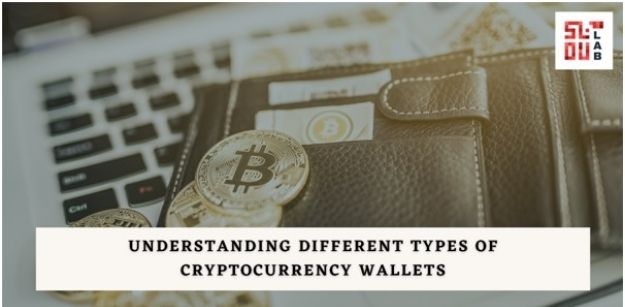Cryptocurrency has definitely given another meaning to money. It has challenged many established norms in the financial services sector and has piqued the interest of governments, investors, technology experts, businesses, and the general public worldwide. The meteoric rise in bitcoin popularity drove the rise in cryptocurrency usage. However, many individuals are curious as to where cryptocurrency is stored. One should also know about cryptocurrency wallet development and the steps involved in creating one.


Thinking where to store your bitcoins. Go get a crypto wallet. But what are these wallets? Which one to go for? Keep reading to know these details.
What are crypto wallets?
Before diving into the varieties that we have for crypto wallets, let us understand what they really are. To begin with, you should understand that cryptocurrency ownership differs from regular currency ownership.
Cryptocurrency is present on the blockchain with the help of a unique address in a wallet. Another feature is that users can make use of their public keys to aid other users in delivering crypto assets. Also, one can make use of a private key to unlock the crypto assets in the wallet.
Consider a crypto wallet to be a regular wallet that is necessary to keep your assets secure. But, unlike the regular wallets, crypto wallets come with ultimate protection that keep your bitcoins safe. Your currency is stored and not held or blocked in the wallets. You can also keep your crypto asset keys safely in the wallet.
What is the benefit of crypto wallets?
Before using a crypto wallet, understanding its benefits is equally important. So, we spoke earlier about how different a crypto wallet is from a normal wallet. The basic advantage of using a crypto wallet is the ability to make transactions using a private key. It is this private key which gives you the ownership that you have the actual right over this virtual money and you can use it whenever you want and as much as you want. Thus, keeping your private key safely is very important. Make sure you use a trustworthy wallet to store your assets.
Different categories of cryptocurrency wallets
Let us take a look at the different options that we have for crypto wallets and what’s the right pick:
Hot wallets vs cold wallets
A wallet which is linked to the internet in any manner can be referred to as a hot wallet. Cold wallets have no such criteria. Their concept is to keep the keys offline on some physical media.
Web wallets
These wallets are fairly easy to use. One can take a look at the blockchains directly in their browser. You do not need any software. This is applicable to both exchange wallets along with any other web-based wallet providers. You can also secure your wallet with a password in most cases.
Desktop wallets
The name itself makes the definition of desktop wallets quite clear. It is the software that one can download and use locally on their computer. Unlike the other web-based wallets, the desktop wallets provide the user full control over their money and keys. Once you create a new desktop wallet, your data is stored locally on your desktop under the file name ‘wallet.dat’. One should make sure to encrypt this information as it includes the private key information which is required in case you want to access your bitcoin address.
Hardware wallets
A random number generator (or RNG) is used to produce private and public keys on hardware wallets. These keys are not linked to the internet but are saved locally. Hardware wallets are a type of cold wallet and are also considered one of the most safe wallets to use.
Beginners might find it a hard task to use these hardware wallets. Also, if the firmware is not implemented properly, it may pose hazards.
Last but not the least, if you want to store your bitcoins for a good amount of time, you should definitely go for a hardware wallet for storage.
Most hardware wallets now let you configure a PIN number to safeguard your device, as well as a recovery phrase – which may be used if your wallet is misplaced.
Mobile wallets
These wallets are very similar to desktop wallets. However, they are particularly used for smartphone applications. Just like paper wallets which use QR codes, you can transfer and receive bitcoins on mobile wallets using these codes. You can make use of mobile wallets for your day to day transactions or payments.
Paper wallets
Paper wallets work with QR codes. You can consider it as a piece of paper with details like the crypto address and private key. It is these private keys which appear in the form of QR codes.
Some paper wallet websites offer their users an advantage of downloading their codes offline with which they can create fresh keys and addresses. However, there is a disadvantage attached to this feature. Due to the easy access to the codes, one can easily hack them and take undue advantage.
There is another situation that a user is likely to face while using a paper wallet. Suppose, there is a need to import your private key from your paper wallet to your desktop wallet. Also, you would like to spend just coins and not all your cash. Now, what happens with the remaining cash? It gets transmitted to a ‘change address’ which has been automatically generated by the bitcoin protocol. There are major chances that you will lose your cash if you are unable to manually set the changed address to the one that is in your control currently.
Takeaway
Beginners might pick a hot wallet, which is more user-friendly than an exchange.
Online wallets and web wallets are the most vulnerable to online assaults and frauds. Conduct research and seek for examples of previous security breaches. Cold wallets are more secure against internet assaults and hacking, but they place all of the burden on you.
If you are looking for any cryptocurrency wallet development services, make sure you choose a reputed company who has the right tech stack available to develop one.



